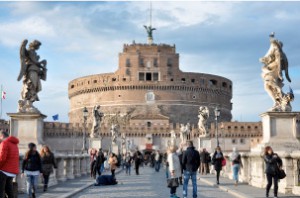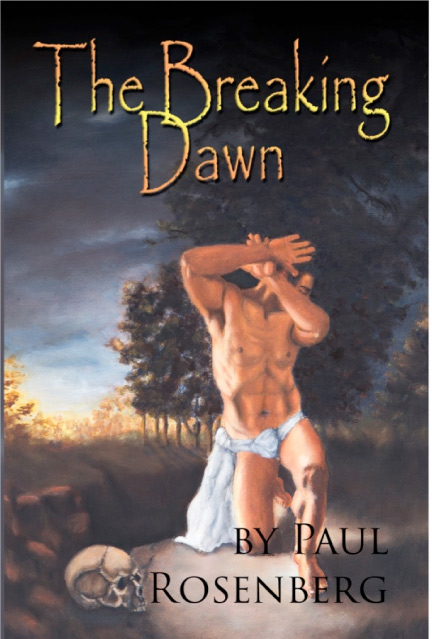 Paul Rosenberg - Freeman**Q**s Perspective
Paul Rosenberg - Freeman**Q**s Perspective
IPFS
When Elite Privilege Breaks
Written by Paul Rosenberg Subject: History Finding parallels with Rome is a fun topic for writers, and just recently I came across some very interesting ones. They grabbed my attention, and they may grab yours as well.
Finding parallels with Rome is a fun topic for writers, and just recently I came across some very interesting ones. They grabbed my attention, and they may grab yours as well.
These passages (in bold) are from The Rise of Western Christendom: Triumph and Diversity, A.D. 200-1000, by Peter Brown:
[E]mperor, military, and civilian populations alike needed the idea of a "barbarian threat" to justify their own existence.
Just as our grand states need terrorists to justify their existence, immigrants to threaten the populace, and outsiders to blame.
Note also that the "civilian populations" required a barbarian threat. That directly translates to today's defense workers, intel agency workers, militarized police forces, and all the millions who've merged their identity with "our heroic protectors." With no big threat, all of that becomes meaningless.
The peasantry had to increase production so as to earn the money with which to pay taxes.
Have you noticed how obsessively young people work these days? People talk about Millennial slackers, and there are some, but I see young families where both parents have to work full time, who work on their smart phones long after business hours, and who are taxed to the hilt without remorse.
My complaint with these millions is not that they're slackers; it's that they're allowing themselves to be driven too hard. They shouldn't take the abuse they do. They are working harder than their parents did… too hard.
Rome slowly lost its grip on the imagination and on the value systems of the inhabitants of the empire and their neighbors in the course of the fifth and early sixth centuries.
This is going on now. Who still believes in politicians as virtuous leaders? As noble statesmen? Who believes that school systems are serving the citizens rather than themselves? Who doesn't have horror stories to tell about the police?
And how many people in other countries believe in the God-ordained, virtuous United States?
To the extent that Hollywood informs our imaginations, our Rome is holding on, but only because it more or less controls Hollywood. And that may fail as well; cracks may already be appearing.
[T]here was one thing the fourth-century Roman state did well, which was to extract money from its subjects.
This one is interesting, because while it's true that our Rome is superb at skimming money from its subjects, it gets an equal or greater amount through what we can call for simplicity's sake "money printing." Rome couldn't do that.
The collection of taxes offered unparalleled opportunities for enrichment for landowners, tax collectors, and bureaucrats. What was gathered through taxes was redistributed at the top, in the form of gifts and salaries paid in solid gold. This process created a swaggering new class….
Can you say, "top one or two percent"? And note that the money was "redistributed at the top," precisely as now. Redistribution goes to the first hands at the spigot of printed money; to Wall Street, being the one and only destination for investments; and to those who purchase favors from the state. These people have indeed formed "a swaggering new class."
So, putting all of these together, we get:
Fears, manufactured or otherwise, to keep the state thriving.
People overworking themselves to keep up with the burdens placed upon them.
People who no longer believe the myth of the glorious state and its righteous leaders.
States that excel only at stripping money from its masses and (now) creating it out of thin air.
Stripping the masses to redistribute money at the top, thus creating a new, luxury-purchasing class.
I think those are rather interesting parallels. And so are the consequences that followed:
[W]e end, around the year 600 A.D., with a world of smaller units, ruled by low-pressure states.
Decentralization, in other words; in my opinion a very good thing.
[T]he villas of the West had been turned into farmhouses.
Notice that the "elite dwellings" were now being turned into working buildings and non-elite dwellings. When centralization and enforced privilege break down, non-elite people return to prosperity.
[I]n one way, the barbarian invasions and the civil wars of the early fifth century did prove decisive. They broke the spine of the empire as a tax-gathering machine.
Here again, I think of money printing rather than tax gathering only. And if the fraying of our "empire" results in "breaking the spine" of money printing and tax gathering, many of us will be thrilled. And given that these systems can only remain intact if the populace is mindlessly compliant, breaking them may not be as difficult as it seems.
Within a century, they had overturned one of the "pillars of bigness" on which not only the court and the army, but the economy and the high pitched social structure of the later Roman empire [sic], had depended.
The pillars of bigness: One nation, under God, with liberty and justice for all, and so on. This self-congratulatory myth needs to be overturned if we ever hope to live in a sane, just world. So does "we're the biggest badass on the planet."
[I]f anyone was happy in the early Middle Ages, it was the peasantry. Freed at last from the double pressure of landlords and tax collectors, they settled back to enjoy a low-profile golden age.
As I've detailed in the subscription letter, the so-called "Dark Ages" were a period of liberation for non-elite people.
And how might we – the peasantry, the people of flyover country – feel about a world without tax collectors, money-scammers, and self-righteous oppressors? I think most of us would welcome it as a golden age.
So, there you have them. I'm not saying that all these parallels will turn out precisely this way, but they do make a very interesting model to work from.
* * * * *
A book that generates comments like these, from actual readers, might be worth your time:
I just finished reading The Breaking Dawn and found it to be one of the most thought-provoking, amazing books I have ever read… It will be hard to read another book now that I've read this book… I want everyone to read it.
Such a tour de force, so many ideas. And I am amazed at the courage to write such a book, that challenges so many people's conceptions.
There were so many points where it was hard to read, I was so choked up.
Holy moly! I was familiar with most of the themes presented in A Lodging of Wayfaring Men, but I am still trying to wrap my head around the concepts you presented at the end of this one.
Get it at Amazon ($18.95) or on Kindle: ($5.99)
* * * * *
Paul Rosenberg
www.freemansperspective.com
























